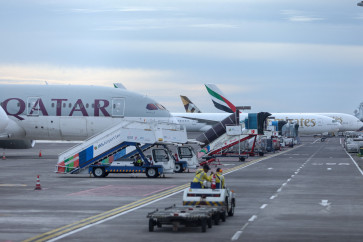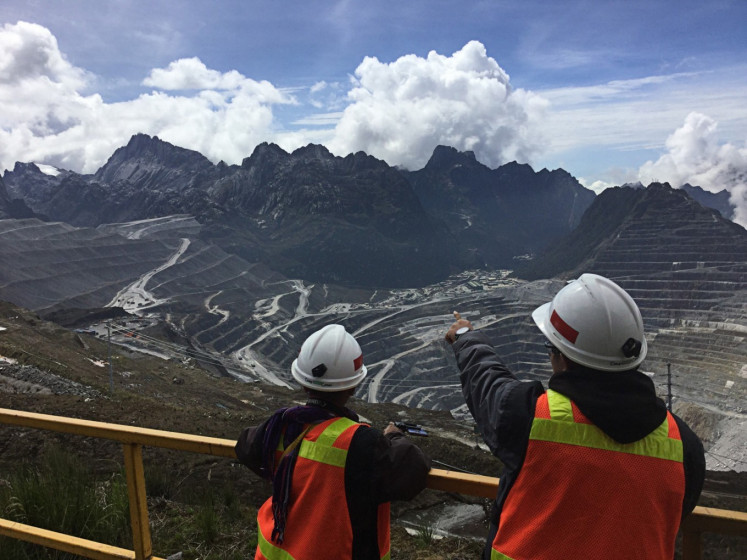Popular Reads
Top Results
Can't find what you're looking for?
View all search resultsPopular Reads
Top Results
Can't find what you're looking for?
View all search resultsBeyond the pandemic: When digital divide meets new normal
In Indonesia, access to the internet is not available to everyone yet, particularly those living in rural areas or remote islands.
Change text size
Gift Premium Articles
to Anyone
 President Joko "Jokowi" Widodo (left) talks with Facebook founder Mark Zuckerberg (right) during a visit to Facebook's headquarters in Silicon Valley, San Francisco, the United States, in February. During the visit, the President expressed hope that Facebook could work with Indonesia in its efforts to become the largest digital economy in Southeast Asia. (ANTARA FOTO/Setpres-Laily)
President Joko "Jokowi" Widodo (left) talks with Facebook founder Mark Zuckerberg (right) during a visit to Facebook's headquarters in Silicon Valley, San Francisco, the United States, in February. During the visit, the President expressed hope that Facebook could work with Indonesia in its efforts to become the largest digital economy in Southeast Asia. (ANTARA FOTO/Setpres-Laily)
W
e have entered a new reality where people around the world have now been physical distancing in some form or working remotely for many months. I am based in Singapore and like many, I am hunkered down for extended stay-at-home life with my family.
While many people were able to shift their lives online, there are still more than 3.5 billion people who lack reliable internet access. Not only does this impact their ability to work or find new work, participate in school and connect with family and friends, but it limits their ability to get timely, accurate information from organizations such as the World Health Organization about how to stay safe and prevent the spread of coronavirus within their communities.
In Indonesia, access to the internet is not available to everyone yet, particularly those living in rural areas or remote islands. Where internet access is available, some people cannot afford it.
This digital divide has a very real impact on whether or not we are able to participate in the opportunities that the internet brings and the new normal that we are currently living in, not only in Indonesia, but across the world.
As we all adapt to this new normal, one thing is evident. Our success in navigating this situation will partly depend on making the internet more inclusive, which underlines the need for countries around the world to urgently expand internet infrastructure. This work has never been more important and we believe that overcoming the internet connectivity challenges of access, affordability and relevance requires a multi-faceted approach.
In Indonesia, Facebook is focused on bringing more people online to a faster internet by connecting the Indonesian archipelago through programs, partnerships and technologies designed to increase the availability, affordability and awareness of higher quality internet access. We are collaborating with our partners in several key ways to help the digital divide in Indonesia, including:
- Expanding access to high-speed fiber: Deploying fiber is a capital-intensive undertaking in an archipelago country like Indonesia. Our Open Transport Networks program is helping to bring fiber to these underserved areas, enabling service providers and internet service providers (ISPs) to provide broadband connectivity. Together with our partner Alita, Facebook Connectivity is investing in 3,000 kilometers of open access fiber optic cables in Bali, Java, Kalimantan and Sulawesi. When completed, this initiative will complement the Palapa Ring to bring higher speed internet services to more than 10 million people, promoting digital inclusion.
- Enabling access to great Wi-Fi: Express Wi-Fi helps to provide great Wi-Fi access when and where people need it. Express Wi-Fi partners with an expanding ecosystem of mobile network operators and internet service providers to help them better provide fast, affordable, reliable and scalable internet access. Through this program, service providers partner with local communities and local entrepreneurs to extend Wi-Fi coverage. In Indonesia, we have Wi-Fi partnerships with BaliTower in Jakarta, and D-Net on Mount Bromo, where our Express Wi-Fi platform helps them build, operate, grow their Wi-Fi networks in a sustainable way.
- Increasing high-quality internet in dense urban areas: Dense cities with complicated infrastructure make it difficult to run fiber to every street. Facebook’s Terragraph is a gigabit wireless technology that provides a fast, affordable and easy-to-deploy alternative to fiber optic cables, and can support use cases such as fixed wireless access, public Wi-Fi and provide the underlying connectivity for smart city services. In 2018, Facebook and XL Axiata conducted a trial of Terragraph in Kota Tua in West Jakarta, delivering public Wi-Fi to thousands of users during the Asian Games. Terragraph relies on the 60 GHz band, which we hope will be made available soon to enable the expansion of high-speed internet to more people, homes and businesses.
- Providing a digital literacy program for first-time internet users: In a collaboration between GSMA and Indosat Ooredoo, our team on the ground developed content and ran a digital literacy program to help first-time internet users get the most out of their online experience. The program worked closely with local retailers and by May 2020, we have facilitated training for 1.4 million users in 4,578 villages.
With the pandemic, how quickly people across the world can access digital tools is becoming increasingly important to help accelerate learning and economic growth, including in Indonesia.
As these efforts continue to progress, Facebook is ready to explore and support new connectivity solutions aimed at bridging the digital divide in Indonesia.
***
The writer is head of connectivity and access policy, Asia-Pacific, Facebook.









